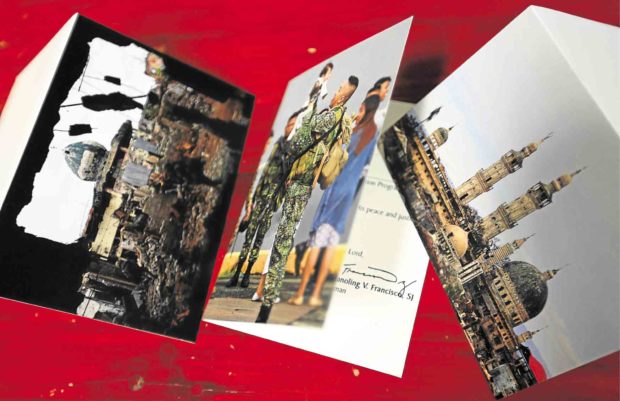
POSTCARDS FROM THE HEART Priest sells Christmas cards with photographs of Marawi on them to raise funds to feed the displaced children and send them back to school. The images were captured by Inquirer photographers. —Edwin Bacasmas
As the nation rings in the new year, striking images from the war in Marawi City captured by Inquirer photographers are providing reminders of Filipinos struggling for a new beginning and motivating other people to support them.
For Tanging Yaman Foundation (TYF), these photographs have painted the condition in Marawi for people wishing to help families who were caught in the five-month-long conflict that erupted in May when pro-Islamic State terrorists began their siege of the city.
Unlike the usual Christmas cards showing the Nativity and other traditional holiday images, the cards created by the foundation for their “One for Marawi” project feature photographs from the battleground and the people whose lives the war had entwined.
Two cards sure to grab attention are of the scarred remains of buildings and proud landmarks of the Islamic city such as the Grand Mosque. Another catches the poignant homecoming of a soldier who survived his deployment.
Fr. Manuel “Manoling” Francisco, TYF founder and chair, said in an interview with the Inquirer that he was hopeful that these images would tug at people’s hearts to help Marawi get back on its feet.
Since June, the foundation based at Ateneo de Manila University has been raising funds to help both the “bakwit” (evacuees) and the soldiers who fought for them.
After the siege, the new and bigger challenge was to restore hope among the people who suffered in the war, Francisco said.
“For the new year, hopefully we reflect on the war in Marawi as an externalization of hatred and animosity that is within us,” he said.
He lamented people’s short memories about conflict and devastation, but hoped the postwar efforts would awaken their “collective consciousness” to reject divisions due to religion and ethnicity.
“Reconstructing the city and rebuilding lives—physically, psychologically—would take years,” he said. “Through media and social media, we can help foster this collective consciousness so that the suffering and pain of Filipinos elsewhere become our suffering and pain, as well.”
Francisco, who was then teaching in Cagayan de Oro, said the outpouring of support came as a surprise. By the end of July, the foundation had raised P5.7 million, which was channeled through partner schools and seminaries to reach those who needed it. As of December, the funds ballooned to at least P9 million.
The holiday cards, he said, were offered to donors only a week before Christmas.
When the idea hatched in November, the theology professor reached out to the Inquirer for pictures that could be used for the new style cards. The final images used were photographs from Inquirer photographers.
So many had ordered the cards that in one week’s time, his foundation had produced almost a thousand, he said.
Fr. Manoling Francisco, S.J. —Jhesset O. Enano
With a minimum donation of P150 for one 4R-sized card, the foundation raised P150,000, which it plans to once again channel through their partners in Cagayan de Oro and Iligan City. The donations would also be used to buy school supplies for Marawi children getting back to their classes.
“The response we received was similar to when Supertyphoon ‘Yolanda’ (international name: Haiyan) struck,” he said.
Established in 1996, the foundation serves as a bridge between people who want to help and those anywhere in the country who are in need.
TYF has partnered with donors that want to assist but are unsure how.
In the beginning, TYF staged concerts to raise funds for the needy, said Francisco, the liturgical composer behind hit songs, such as “Tanging Yaman,” “Hindi Kita Malilimutan,” “Sa’yo Lamang” and “One More Gift.”
It started to change tack in 2006 after Typhoon “Milenyo” (international name: Xangsane) devastated Bicol province.
Francisco, who was in the United States then, reached out to his contacts here and abroad to raise funds for Bicolanos struck by the disaster.
“That was a eureka moment for me,” he said. “I realized that there was no need for major concerts with multimillion production costs to raise funds.”
“You just need to appeal to people and if they believe in the cause and if the organization is transparent and accountable to them, then they would help,” he said.
Its efforts had translated to tangible help for thousands in Marawi. They arrived as sacks of rice, food packs, hygiene kits and school bags for families and children still living in evacuation centers.
More than 2,600 soldiers also received care packs, including food, clothing and vitamins.
Francisco said the holiday cards would be redesigned to make it relevant to all occasions, not just Christmas.